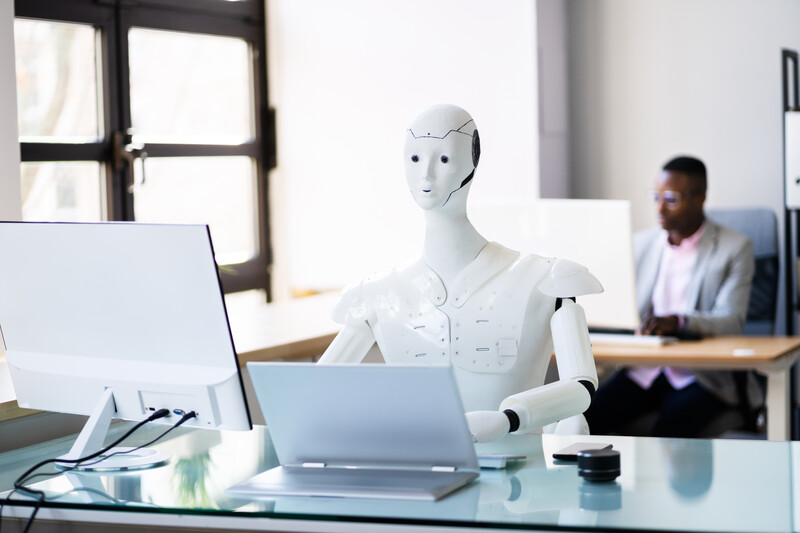by Stephanie Chambers
I read this article https://www.theguardian.com/technology/2023/mar/23/tech-guru-jaron-lanier-the-danger-isnt-that-ai-destroys-us-its-that-it-drives-us-insane recently about how AI and robots taking our jobs won’t be the big issue in the future. He says the main problem we will face is that AI will affect our ability to relate as human beings to one another and this will negatively affect our mental health.
Jaron Lanier makes some good points. The research has already been showing that teenagers especially have often felt the sting of comparing themselves to others via social media and cyber bullying. At times, this has led to suicide.
So, he isn’t just talking about the annoyance we face when we don’t like the options on the answering machine. When we really want to speak to a real person, but that option is never presented. Or when the automated chat bot can’t answer our questions. And we really want to have the help of a real person instead. Tearing our hair out in frustration isn’t the level of insanity he is talking about.
In his many books on the topic, he talks about how we may have protested about rabbits being used for science, we have let ourselves be studied by our phones. And as a result of these sneaky studies, now our phones know how to hypnotize us into making decisions to financially benefit corporations.
We get feel good rewards that lead us in the direction others want us to do. After scrolling mindlessly on Facebook for hours, we are more tempted by the ads we see on it.
Many years ago I read about studies that showed our continual use of GPS was making our spatial capabilities deteriorate from under-use. This scared me enough to make me force myself to work out how to drive to my nearest city without it. And it made me aware that we shouldn’t blindly adopt technology thinking it will help us.
So how can we stop AI from making us insane?
There is technology we can use. A thorn to remove a thorn perhaps? This tech can make us aware of how long we have been online and suggest we take breaks. We can also use technology to put limits on our children’s activities online.
We can take ourselves off social media altogether. Like going cold-turkey this may feel hard to do. But without the prop of social media, we will be forced to actually phone and arrange for face to face walks, lunches and meetings with our friends and family. Otherwise we will have no clue what has been happening in their lives.
But now that most local newspapers no longer exist, Facebook often seems the only way to find out if someone you know dies (albeit someone you obviously aren’t in close daily contact with).
Another less extreme approach, is that you should definitely set your privacy settings on Facebook and Google to not track your location and not use your personal information for ad targeting. You should not use the Login with Facebook (or Amazon) when you access other sites and you should turn off sharing information with any app. You can also turn off running Facebook in the background so you are only using Facebook when you are actually using Facebook.
It will be easier for fake news to be generated than real news. To report on the facts, journalists normally go and meet the people involved. Will a bot just phone the people involved? Will they bother to give the details once they work out they aren’t talking to a real person. How will they know they aren’t talking to a real person?
The other important aspect is that working gives many of us a purpose in life. How will we find a new job if we are a writer or artist when new tools like Open Chat GPT and Midjourney and DALL-E reduce the number of people needed to do our jobs? If large numbers of people end up unemployed, how will they find purpose in life?
There is supposed to be an increasing need in taking care of the elderly – robots won’t be able to do everything involved in that. So maybe retrain to help fill this need? Unfortunately, wages in this area are typically very low.
We can resist and protest all of these technological changes. If we are in management ourselves, we can slow the rate of change by not being the first to adopt all of these new AI advance.
And by inviting our friends and family over for dinner to discuss this and other more fun topics, we can reinforce the need for human to human contact of all forms.
We also have to be aware of programmed-in biases
Even unconsciously the person who originally programmed the AI in the first place, may have biased it. So what if AI denies someone a loan because of their gender or classifies someone as a criminal because of racial prejudice? So, artificial intelligence may increase the already huge injustices in our society.
We should put pressure via our government representatives to establish ethical guidelines for the development and use of AI. And to make sure all AI systems are transparent and explainable.
And who can we complain to when it does?
If we are denied access to a human being, we may be knocking our heads against a brick wall. A supposedly super intelligent artificial bot brick wall. So, we need to demand that the companies we deal with provide human to human interaction and mechanisms to complain about lousy AI service.
Speaking of lousy AI service, I decided once again to test OpenAI’s ChatGPT. It wrote some stuff and mentioned research and so I asked it to provide links to the original research articles. Two out of the three links it supplied led to pages which said “Page Not Found.” On their own page about the product, they say “May occasionally generate incorrect information” and “May occasionally produce harmful instructions or biased content” and “Limited knowledge of world and events after 2021.”
So if this is going to revolutionize the world, it had better improve somewhat and fast. Otherwise we really will have something to complain about and all the hype is not warranted. And if any of this future talk makes you anxious, schedule an appointment with one of our counselors to talk about it. They will give you a more genuinely empathetic response than any therapy bot ever could.
Relevant research:
1. https://www.pnas.org/doi/10.1073/pnas.070039597 – “Navigation-related structural change in the hippocampi of taxi drivers”
2. https://www.ncbi.nlm.nih.gov/pmc/articles/PMC9582945/ – “Does global positioning system-based navigation dependency make your sense of direction poor? A psychological assessment and eye-tracking study”
3. https://pubmed.ncbi.nlm.nih.gov/31509167/ – “Associations Between Time Spent Using Social Media and Internalizing and Externalizing Problems Among US Youth”
4. https://pubmed.ncbi.nlm.nih.gov/27294324/ – “#Sleepyteens: Social media use in adolescence is associated with poor sleep quality, anxiety, depression and low self-esteem”
5. https://pubmed.ncbi.nlm.nih.gov/25899879/ – “Using Social Media for Social Comparison and Feedback-Seeking: Gender and Popularity Moderate Associations with Depressive Symptoms”
6. https://www.ncbi.nlm.nih.gov/pmc/articles/PMC4853817/ – “Association between Social Media Use and Depression among U.S. Young Adults”
7. https://www.ncbi.nlm.nih.gov/pmc/articles/PMC6266525/ – “Self-Esteem, Social Comparison, and Facebook Use”

